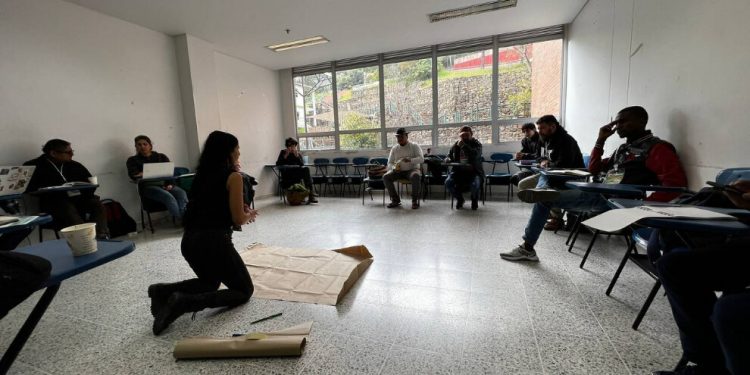BOGOTA – The three-day conference began on 28 July. 50 organizations from 15 countries participated in the conference titled “Challenging Capitalism Until It Builds a Democratic Society”, in which Kurdish People’s Leader Abdullah Öcalan’s “Democratic Nation and Democratic Confederalism” paradigm was discussed.
On the second day of the conference, different working groups were formed. These groups gathered around the titles such as “Self-Government”, “Ecology and the region”, “Economy and the region”, “Women and women’s freedom”, “Conflict of thoughts”, “Youth” and “State and democracy”. In the discussions carried out around these topics, the common aspects of the struggles in different geographies were tried to be determined.
WOMEN’S TABLE
While a map showing which country each woman came from drew attention during the discussions at the women’s table, papers describing the main goals of women were attached in the form of a net. At this working table, the Kurdish women’s movement shared its own experiences and the proposal for World Women’s Confederalism was opened for discussion. The working group then focused on key issues that hinder women’s struggles. Attention was drawn to the attacks on women’s bodies through different symbolic activities. Women from different organizations in Mexico, Peru and Colombia participated in the women’s workshop. Young feminists, women interested in the struggle of black peoples, movements interested in public education and fighting for social transformations took part in the workshop.
STATE AND DEMOCRACY TABLE
Mexico, Colombia, El Salvador and Kurdistan attended the table where the State and Democracy were discussed. While the differences between the nation-state and the state and the strategies of struggle against the nation-state were discussed, the participants agreed that the nation-state is a tool of exploitation.
ECONOMY TABLE
At the economy table, participation from organizations in Brazil, Canada and mainly Colombia stood out. After the description of the economy, alternative economies were discussed in the working group, and the existing experiences in this field and the obstacles they faced were discussed.
ECOLOGY TABLE
At the ecology desk, the indigenous peoples desk in Colombia and the African-Americans who struggled for identity there attended. The damage caused by the mega projects of multinational companies that plundered the land and expelled the indigenous rights from their lands became the main agenda. Under the name of ecological development, the damage caused by lithium and different projects to the soil was explained. While describing the attacks against nature regarding Kurdistan, it was pointed out that the separation of history, nature and women from each other actually facilitated the policies of plundering the land. In this way, it was explained that attacks were carried out in which the historical memory was destroyed. In this regard, in the struggle of the local peoples and the Kurdish people, the common aspects came to the fore. For this reason, the definition of “struggle for survival” was made instead of the struggle for ecology.
YOUTH TABLE
The youth table included predominantly Colombian organizations and the youth branches of an umbrella organization in Peru. Discussions were held on the definition of youth and how to overcome the gap between generations. Kurdistan youth movement shared its experiences in this group.
SELF-MANAGEMENT DESK
One of the working groups where heated discussions took place was the self-management desk. The executives of many organizations, especially from Colombia, preferred to attend this table. There were participants from Paraguay, USA and Kurdistan. After the definition of self-government was made, the practices in different regions, the steps taken and the democratization of the state were emphasized.
At a final table, different views were discussed. “What kind of world, what kind of system do we imagine?” Answers to the question with a philosophical aspect were sought.




